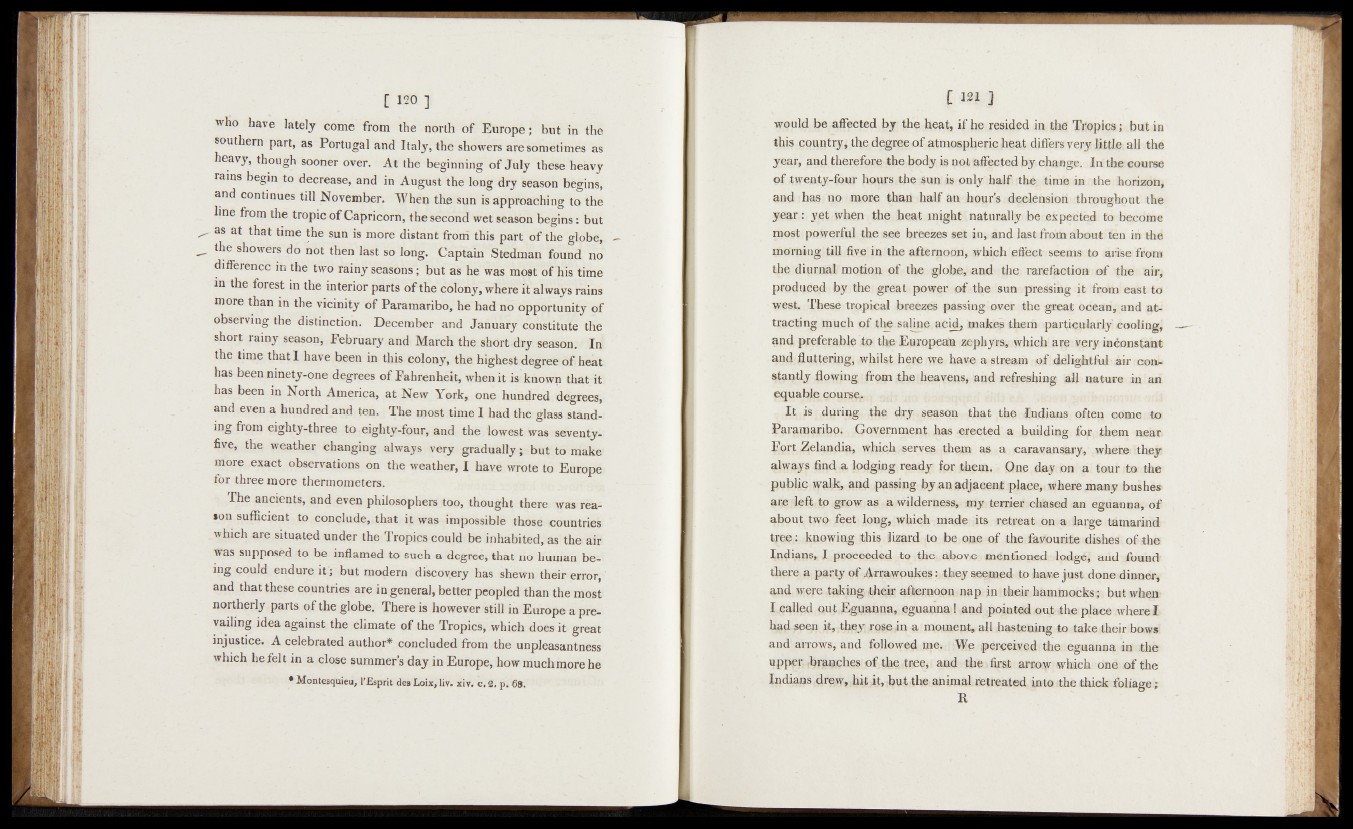
wHo have lately come from the north of Europe f but in the
southern part, as Portugal and Italy, the showers are sometimes as
heavy, though sooner over. At the beginning of July these heavy
rams begin to decrease, and in August the long dry season begins,
and continues till November. When the sun is approaching to the
line from the tropic of Capricorn, the second wet season begins: but
as at that time the sun is more distant from this part of the globe,
the showers do not then last so long. Captain Stedman found no
difference in the two rainy seasons; but as he was most of his time
m the forest in the interior parts of the colony, where it always rains
more than in the vicinity óf Paramaribo, he had no opportunity of
observing the distinction. December and January constitute the
short rainy season, February and March the short dry season. In!
the time that I have been in this colony, thé highest degree of. heat
has been ninety-one degrees of Fahrenheit, when it is known that it
has been in North America, at New York, one hundred degrees,
and even a hundred and ten. The most time I had the glass standing
from eighty-three to eighty-four, and the lowest was seventy-
five, the weather changing always very gradually; but to make
more exact observations on the weather, I have wrote to Europe
for three more thermometers.
The ancients, and even philosophers too, thought there was reason
sufficient to conclude, that it was impossible those countries
which are situated under the Tropics could be inhabited, as the air
Was supposed to be inflamed to such a degree, that no human being
could endure i t ; but modern discovery has shewn their error,
and that these countries are in general, better peopled than the most
northerly parts of the globe. There is however still in Europe a prevailing
idea against the climate of the Tropics, which does it great
injustice. A celebrated author* concluded from the unpleasantness
which he felt in a close summers day in Europe, how much more he
• Montesquieu, 1’Esprit des Loix, liv. xiv. c. 2. p. 68.
would be affected by the heat, if he resided in the Tropics; but in
this country, tfie degree of atmospheric heat differs yejy little all the
year, and therefore the body is not affected by change. In the course
of twenty-four hows the son is paly half the time m the horizon,
and has no more than half an hours declension throughout the
year: y^t when the heat might naturally be expected to become
most powerful the see breezes set in, and last from about ten in the
morning till five in the afternoon, which effect seems to arise from
the diurnal, motion of the globe, awl the rarefoetidn of the air,
prod peed by the great power of the sun pressing it from east to
west. Thesé tropical breezes passing over the great ocean, and attracting
much of the. saline acid, makes them particularly cooiihgi _-
and preferable to t)^; European zephyrs^ which are very iaénnstaiit
and ft uttering, whilst here we have a stream of deligiktfrd air con*-
stently flowing from the heavens, and refreshing all nature in an
equable course-
It , js j during the day season that the Indians often come to
Paramaribo* Government has erected a building for. them near
Fprt Zelandia, which eeryeg ithem as a caravansary, where they
always find-a lodging ready for them. One dayon a tour to the
public walk, and passing by an adjat^at plaeei where many bushes
aredeft fo grow as a wilderness* my temer chhsed an eguanna, of
about two feet loog, which made its rctreat.ion a llarge tamarind
q-oe;: knowing this lizard to be one of the favouritedishes ofthe
Indians, I proceeded to and found'
there a party of Arrawpukes :,tbey seemed to have just done.dinner,
and, were taking, thqft afternoon nap in their hammoefess; but when
I called qut JEgpanna, eguanna! and pointed ouMhe; place where I
had seen ft, rpsedn a mentent» all hastening to fakeiheir boiws
and arrows, and followed me.- : We perceived the eguanna in the
upper -branches of the. tree, and the > fi^ai^^oriiiiehiMllid of the
Indians tdrew, hit it, but the animal retreated. into the thick foliage;
E